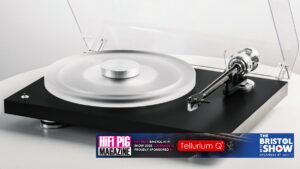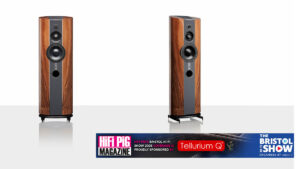SPIN CLEAN Record Washer
With so many people re-discovering their record collections and many others relying on charity shops to provide them  with the “black magic” these days, cleaning LPs has never been more important. Why bother? Some schools of thought (prominent audio industry folk) used to proclaim that records should never be cleaned (really!) but the truth is the humble LP needs to be kept clean for several important reasons. These include the prevention or removal of mould and grease marks from older records, removal of tiny gritty deposits of dirt that will otherwise for-shorten your stylus life, and last but not least because LPs sound far better when clean!
with the “black magic” these days, cleaning LPs has never been more important. Why bother? Some schools of thought (prominent audio industry folk) used to proclaim that records should never be cleaned (really!) but the truth is the humble LP needs to be kept clean for several important reasons. These include the prevention or removal of mould and grease marks from older records, removal of tiny gritty deposits of dirt that will otherwise for-shorten your stylus life, and last but not least because LPs sound far better when clean!
Clean LPs reduce stylus wear, which saves you £££’s long term and the records also sound great when properly cleaned. If they were undamaged to begin with, they should be near to silent when cleaned and in improving (lowering) noise floor, the dynamic range is restored and the music will sound great. It’s not enough to just clean the LPs without also storing them in anti-static sleeves after use and always taking care when handling them too.
Of the many different ways to clean records, a few are advisable and a few are not. Tap water is generally a no-no because it leaves mineral deposits and limescale on the surface when dry. Also, the water, without an anti-surfactant simply cannot get into the very bottom of the grooves to loosen the dirt up so some resort to washing-up liquid. That in itself isn’t the best of things to do because it contains lots of salt in its make up. So we come to the record cleaning machine, or RCM for short. Very effective at removing dirt and uses chemicals tailor made for the job, so all good? Not quite, most RCMs cost more than entire record collections are noisy in use and also take up space.
I can see why CD became so popular! Not all is lost though because there are two other common solutions to the problem and the first is to make your own RCM whilst the second is to run out and buy a Spin Clean bath and bottle of cleaner. Never heard of Spin-Clean? No? Well it’s a nifty little device that is inexpensive and is designed to remove all that crud from your LPs using a specially formulated cleaning solution, so could this be what you’ve been missing all this time? Read on.
The Spin-Clean bath is a bright yellow elongated rectangular shaped bath with deep sides designed to take a single LP to about half depth (just under label depth actually). The idea is that once full of the cleaning solution, you simply spin your LPs one at a time back and forth and they come out clean as a whistle leaving all the dirt in the bat. So how  does it work?
does it work?
The bath has two rollers, one at each end, which help support the LP so that it is immersed up to the run-out grooves. In the middle, a pair of cleaning brushes effectively clamp the LP in place but not so tight that it can’t be moved, and you then firmly grip the sides of the LP and rotate three times in one direction then three times in the other direction, remove and dry using one of the supplied drying cloths (the cloths first need washing and drying to remove fluff and lint and to enhance absorbency). The bath is first filled to just below the rollers with distilled water (which isn’t that cheap these days…I paid £4,99 for a 5 litre container from a local car parts store). After adding the distilled water to the bath you add just one cap-full of the cleaning solution by pouring over the central brushes, then proceed with cleaning your LPs. You can do up to 50 on one clean say the instructions.
How did it go then? Well I took 10 of my LPs that I knew needed cleaning, plus a new LP that was stored in a cardboard sleeve so had attracted dust and fluff. I started with the new LP which also happened to be on 180g vinyl and it was here I ran into the first minor quibble. Ordinary LPs of normal thickness rotate quite easily in the Spin-Clean, but 180 or thicker take quite an effort to move once gripped by those brushes. In fact I’d say do not use this for anything over a 180g weight or you might end up cursing a great deal and even damage the LP. For ordinary LPs its fine.
To dry, I placed the cleaned LP on some newspaper and as per the instructions wiped the LP surface dry in a clockwise circular motion before storing. You’ll need a stack of old news-papers by the way if doing a batch of LPs.
After a few LPs were done I looked into the bath and sure enough, the water was slightly dis-coloured and a little muck had appeared at the bottom. After 10 LPs there was an alarming amount of dirt and fluff in the base of the bath! Close inspection revealed that for some bizarre reason, some of the “dirt” comprised hair. The amount of hair in the  bath could have correlated with my own hair-loss in the past year so there you have it, persevering with LPs causes hair loss! It was quite surprising though to note just what had come off a handful of LPs and that bright yellow bath showed it up very well (see photo). . My recommendation would be not to clean more than 10 or 15 LPs before changing the water and solution, partly due to the accumulated dirt you’ll get and partly because the drying cloths supplied will no longer be dry! (you could always use a micro-fibre cloth too) After usage, the water was disposed of and as per the instructions the rollers, brushes and bath were rinsed in warm water before air-drying and storing away.
bath could have correlated with my own hair-loss in the past year so there you have it, persevering with LPs causes hair loss! It was quite surprising though to note just what had come off a handful of LPs and that bright yellow bath showed it up very well (see photo). . My recommendation would be not to clean more than 10 or 15 LPs before changing the water and solution, partly due to the accumulated dirt you’ll get and partly because the drying cloths supplied will no longer be dry! (you could always use a micro-fibre cloth too) After usage, the water was disposed of and as per the instructions the rollers, brushes and bath were rinsed in warm water before air-drying and storing away.
The acid test…how did the LPs sound? Well it was beyond dispute that the SPIN Clean effectively removes dirt and fluff you’d not normally see on an LP surface but did it make them sound like new? That depends largely on their condition to start with but I had chosen LPs that were graded close to NM (Near Mint) to start with. Disappointingly, there was lots of static noise and the action of drying the LPs by rubbing with a cloth hadn’t helped the static. I compared a double LP set, one LP having been cleaned in the Spin Clean bath and the other using my own homebrew RCM which used a solution of distilled water, IPA and wetting agent, which was cleaned by scrubbing with a carbon brush and the solution before using a modified vacuum to suck up the muck and dry the surface. I have to say that comparing the surface of the LPs the homebrew solution and cleaning method won out. The surface had that “as new” sheen to it and was free of any dust. The Spin-Clean cleaned LP was clean enough looking, but lacked that sheen and had attracted a little dust from static. Sound wise, the homebrew cleaned LP was silent and as new, so it was more effective.
However, the effort needed to make and use the home made cleaner was in excess of that to use the Spin Clean and it was a noisy affair like using a regular RCM. For best sonic results it was a clear winner, but if your aim is to get rid of as much dirt from charity shop LPs or clean long neglected LPs, then PROVIDING you insert the LPs into anti-static sleeves as soon as you finish using the Spin Clean, it can get through a large stack in double quick time and it will remove a majority of the muck. I got the impression though that it was never going to be as effective as a vacuum based cleaning machine using a solvent based cleaning solution. One other thing you have to be wary of too is that the labels get no protection from being wet and in drying the LP you have to be careful not to rub part of the soaked label off as I did! Overall though, it remains a nifty little device that is effective (up to a point) and for the money (about £80), has got to be recommended albeit with the provisos already mentioned taken into consideration.
Author – Paul






























































